Japan P&I published a loss prevention bulletin on marine weather and the ship handling in rough seas. Navigating in rough weather conditions deserves extra attention from ship operators; Waves caused by winds and swell from several directions results to vessels experiencing a number of oscillations. Thus, it is crucial to have a precise grasp of the lengths of waves and their undulations, their cycle and wave heights in order to operate safely.
Mainly, when a vessel sails in head seas, its hull experience severe shocks which induce violent ship motions. The ones that are experienced are able to respond by altering the ship’s course and speed as needed. Yet, to accomplish safe navigation in head seas, it is advisable to have more reliable ship-handling techniques backed by theoretical knowledge as to why these phenomena are created and how to avoid the generation of these critical effects, in addition to possessing sea-going experience.
When there are wind and waves, the vessel is at the mercy of the sea. Additionally, depending on the ship’s relative position in waves and, whether it is being lifted up to the top of a crest or falling into a trough, hogging, sagging and twisting forces generate great deflections in the entire hull structure.
In addition, the ship’s speed is usually decreased by wind and wave resistance. This phenomenon is particularly augmented in head seas.
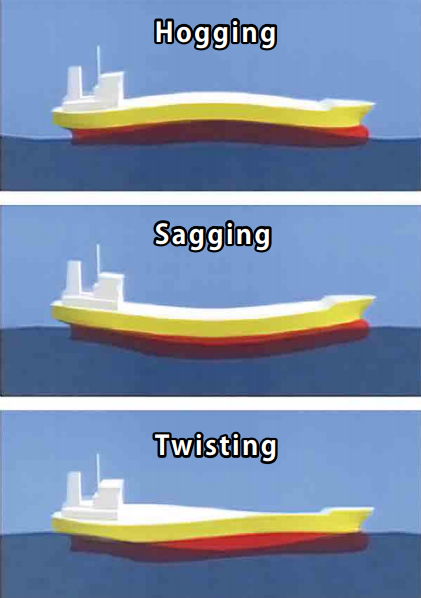
Pitching intensified motion in head and countering seas of rough weather has the greatest influence on the safety of a ship.
When wave length is shorter than ship length(Lpp): Because the ship motions are insignificant as the influence of waves is weak, the bottom of the bow neither rises enough to be exposed dangerously nor dips enough for the fore deck to take on water.
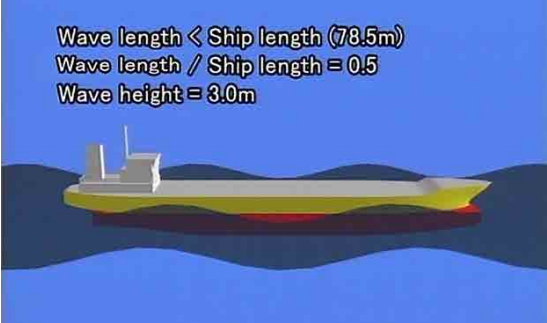
When wave length is longer than ship length (Lpp): A ship pitches and heaves slowly at the front and rear surface of waves that will affect its form. However, this does not cause significant movement.
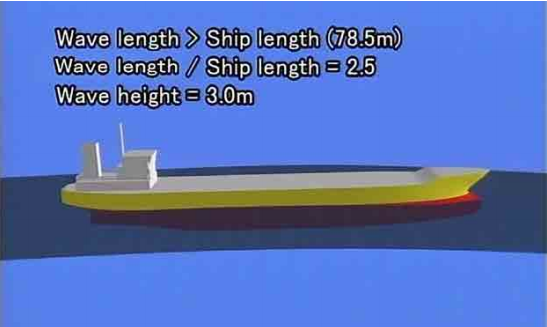
When wave length is almost equal to ship length (Lpp): When wave length is almost equal to ship length, ship motion will be most intense. The heaving of the bow on a crest and the plunging of it into the succeeding wave will be accelerated.
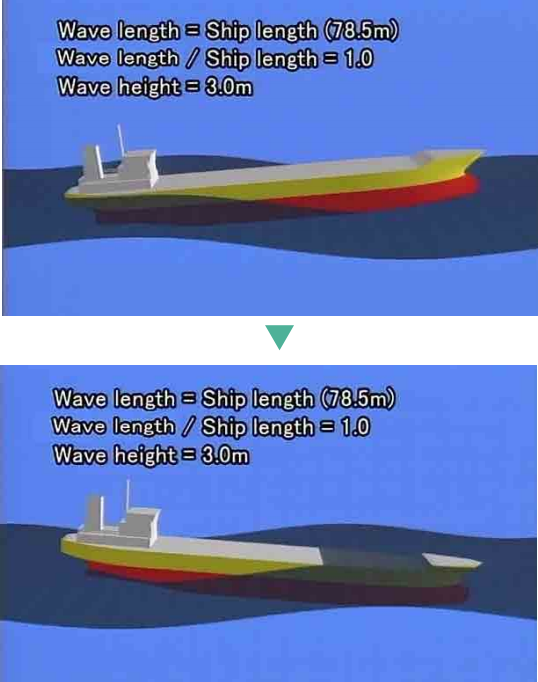 In such cases, changes in water level both forward and aft become particularly great in regular wave conditions and relative water level at the bow is greatest when wave length is equal to ship length, and seas are likely to be shipped when the relative water level exceeds the freeboard at the bow, while in contrast, slamming may occur when the relative water level drops far enough below the forward draft to the extent that the bottom plates at the bow are exposed.
In such cases, changes in water level both forward and aft become particularly great in regular wave conditions and relative water level at the bow is greatest when wave length is equal to ship length, and seas are likely to be shipped when the relative water level exceeds the freeboard at the bow, while in contrast, slamming may occur when the relative water level drops far enough below the forward draft to the extent that the bottom plates at the bow are exposed.
In addition, the rough sea weather conditions, result to:
- Propeller Racing: Whenever a ship pitches and heaves heavily at the bow, an equivalent heaving motion is generated at the stern. Due to these motions, the stern lifts out of the sea at intervals exposing part of the propeller and causing instant increases of propeller revolutions accompanied by intense vibrations due to the abrupt reduction of propeller load. This phenomenon is called propeller racing and can have adverse effects not only on the propeller itself, but also on the propeller shaft and engine Therefore, it is recommended to make the stern draft as deep as possible so that propeller immersion is kept at more than 20% of the diameter of the propeller when navigating in rough seas. However, when trimming excessively for a ballast passage, forward draft will be reduced. As the possibility of slamming phenomenon increases, it is essential that the hull’s condition be properly maintained in light of this,
- Speed reduction and a torque rich effect on the engine: When the vessel receives waves and undulation from the front, the resistance of these combined with additional wind pressure, the ship’s speed will decrease, and the engine will undergo a torque rich effect. Figure 66 illustrates speed reduction characteristics in irregular waves. As resistance to the hull increases, the engine requires more fuel in order to maintain the same number of revolutions as set under normal conditions, forcing the ship to plough through the water under excess engine load. This causes what is known as a torque rich effect and may often result in engine trouble due to overheating, or in a great waste of fuel. In such conditions, it is essential to reduce ship speed, because the engine might be damaged as a result of over-heating or it may consume a huge amount of fuel unnecessarily.
- Shipping Seas: A ship may sometimes sustain severe damage from the impacting green seas. Deck machinery, deck cargo and hatch covers are often damaged as a result of shipping seas which may cause water to enter into the holds. Damage sustained from shipping seas is two-fold: damage caused to the bow from green sea pounding, and damage inflicted on deck machinery and appliances from the subsequent incursion of sea water The dynamic pressure of green sea pounding on the deck vertically from above may reach around twice that of seas being shipped. Furthermore, the dynamic stress of a sweeping mass of launched and shipped seas over decks, proportional to the square of the ship’s speed, becomes almost as great as that from vertical pounding. Deck machinery such as sounding pipes and so on can be damaged as a result.
- Slamming Phenomenon: When a ship sails at a relatively high speed in head seas, slamming may occur. Slamming can be broken down into the following categories:
- Bottom slamming;
- Bow flare slamming;
- Bow breaking wave impact.
Although the precise prediction of weather and sea conditions has improved over the recent years, it is still not 100% guaranteed. Naturally, although one may choose a route with a detour, there may be a situation whereby a shorter voyage was not taken due to a misinformed rough sea forecast.
Concluding, for additional information on ship handling in rough weather, you may click on the PDF herebelow
































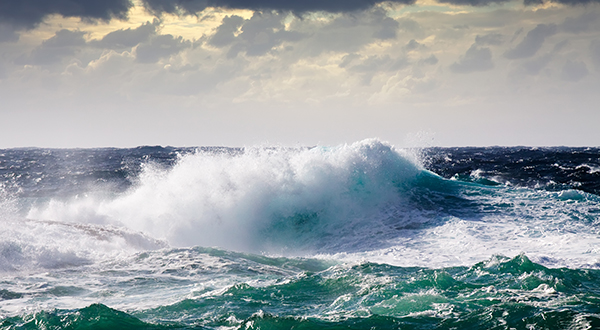
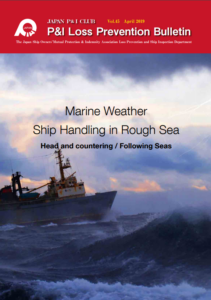






























The details mentioned is very much knowledgeable on handling vessels in rough seas.